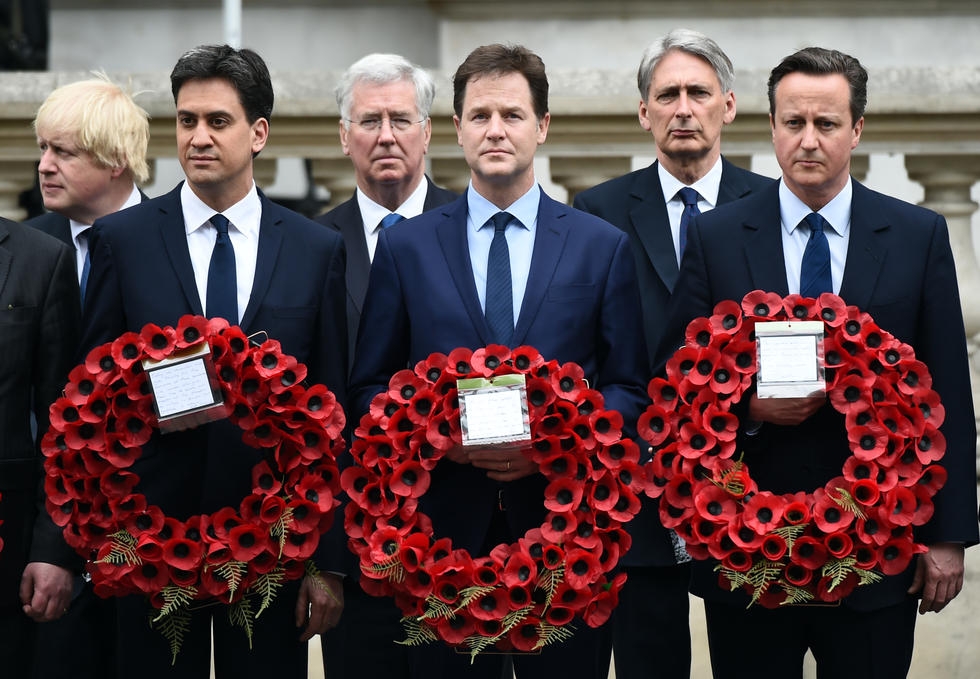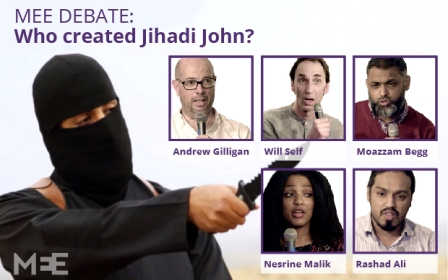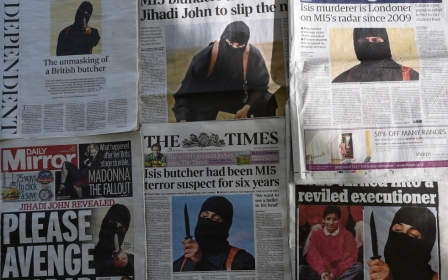Political violence: A typically British denial

Since the jihadist attacks on the Twin Towers in September, 2001, the issue of political violence has gained a new sort of salience - endlessly debated in the mainstream media, fuelling enraged spats across the whole span of social media, and even dividing us against ourselves, as we reel from successive atrocities committed by actual flesh-and-blood humans in all respects like ourselves, and wonder: would I be capable of murder in support of an ideal? OK, I made that last one up - very few people in the West seriously consider whether they themselves might get involved in political violence.
Indeed, much of whatever pride the British have in their society is founded on a belief in its fundamental decency - a distinctively British virtue, compounded in equal parts of impartial justice, a free press, a democratically elected government, and a pacific civic arena. Saying please and thank you, offering elderly people seats on public transport, and not decapitating your political opponents are all seen as roughly equivalent. It’s an ethical standpoint the British have maintained they cleave to for centuries - one encrypted, for example, in the novels of Jane Austen. Although written for the most part during the protracted and bloody Napoleonic Wars, reading her oeuvre you’d never suspect any of her characters of either perpetrating or suffering from anything as vulgar as political violence; on the contrary, we are shown ill-manners and other social solecisms as sound indications of any moral shortfall, with the underlying message being that he who is rude in the drawing room may well put you in the morgue.
For the British schooled in this way, extra-state political violence is, quite simply, too rude to contemplate. You might conclude from this that Britain is a country that holds no brief for political violence whatsoever - but of course, such a notion is absurd. Any modern nation state’s raison d’etre is constituted by its monopoly on the exercise of violence, and the British state, far from being an exception, is a perfect exemplar. What I wish to suggest in what follows, is that since the 11th September 2001, the flimsy psychic bulwark which allowed the British public to believe there was a fundamental moral distinction between its government’s use of violence and extra-state political violence has been breached. If we understand this, then we can comprehend all the weird cognitive dissonance reverberating out from the jihadist atrocities currently being committed worldwide, but especially in former-Iraq.
To a politically sophisticated onlooker equipped with the necessary objectivity (and in order for this to be the case, such an observer might well have to be from Mars), the debate over the legality or otherwise of Britain’s participation in the so-called “Coalition of the Willing” that toppled Saddam Hussein’s regime would seem, frankly, absurd. To imagine the United Nations’ further resolve alone would render ethically pure the 2003 invasion - which was, in truth, motivated by a mixture of misplaced vengeance, grudge, deranged idealism, and greed - would seem the height of ridiculousness to our Martian. The United Nations is in nowise a democratically accountable body capable of enforcing independent rule of law globally, and yet people the world over - and particularly in Britain - constantly refer to it as if it were such an institution. Why?
Well, hope springs eternal, and in the West, in the late 20th century and now into the 21st, the ever-recoiling hope is that humanity - conceived of as a unitary phenomenon - will realise its own potential goodness, cooperate effectively, and banish political violence of all kinds from the world. Different political and ethical thinkers give differing accounts of how this global enlightenment is going to come about, but the plausibility of one scenario as against the next needn’t concern us here, since the outcome they all envisage is so manifestly impossible.
Impossible for contingent reasons alone: the nearing-nine-billion population scrabbling for sustenance in a warming world are already engaged in resource wars (such as the invasion of Iraq), and enforced migrations (each week now, hundreds are dying on the modern ‘middle passage’ from Libya to Lampedusa) - yet more importantly, impossible for reasons which, if not absolutely universal, have nonetheless manifested in almost every human society there’s ever been. Mohammed Emwazi, the Kuwaiti-born British jihadist, whose participation in ritualised, videoed and webcast beheadings perpetrated by Islamic State has brought him global notoriety under the sobriquet, Jihadi John, is the very personification of those reasons: a well-educated young man from a reasonably affluent background who appears to have chosen, of his own free will, to employ the most viscerally extreme violence in pursuit of religio-political ends. In Britain, the revelation that Emwazi was “one of us” has resurrected the stunned collective state we were in following the revelation the 7/7 bombings on London tubes and buses were perpetrated by home-grown terrorists.
Recall: we don’t do extra-state political violence in Britain. Even if we make a glancing acknowledgement of Irish republican terrorism, it’s always accompanied by caveats: this is a wholly different kind of armed struggle - territorial rather ideological - and consequently the IRA, no matter how “real,” can safely be dismissed as acquisitive criminals intent on an aggravated burglary of the Six Counties. When Les evenements swept Paris in the late 1960s, or Red Army Faction and Red Brigades terrorism infected Germany and Italy in the 1970s, Britain remained smugly aloof - its domestic leftist incendiaries, the Angry Brigade, confining themselves to the occasional act of sabotage, or largely ineffective letter bomb.
That young Britons - no matter how naïve and impressionable and no matter how violence-predisposing their parents’ religion - should choose to journey to far off countries of which we know very little, and there engage in such foul behaviour… Well, there can be no recourse to anything but the vernacular to express our confused outrage: we’re flabbergasted. Aren’t our values good enough for them? Don’t they marvel at the spectacle of modern Britain, its people marching in lock-step towards a future of both spiritual goodness and material abundance? Clearly not - and while I take it as given that at least part of their motivation for going to join the jihad is a rather more clear-eyed view of what Oscar Wilde described as “the native land of the hypocrite,” I don’t wish to concern myself here with the he-said-no-they-said of geopolitical culpability in the post-9.11 wars. Rather, what I want to expose is the extent to which Britain in particular is in thrall to a cult of violent death - one the effects of which its citizens are unable to assess, due to their deep and comprehensive denial.
Joy in killing
The following quote comes from The Junior Officers’ Reading Club by Patrick Hennessy; a well-written, sensitive and morally intelligent account of a young British Army officer’s experiences in the Iraq and Afghanistan conflicts: “But what I couldn’t say in an email, because maybe at the time I didn’t know or I didn’t want to believe it in case it ran out or wasn’t true, was just how easy it all was, how natural it all felt and how much fun.” Hennessy is describing his first “contact” with Taliban insurgents fighting in Helmand; it’s a dramatic scene that ends with our hero loading the bodies of those he’s killed on to a pick-up truck. You might have thought such a grisly denouement would take the bloom off perpetrating homicidal violence, but it’s to Hennessy’s credit that he tells it like it is, and when his second fire-fight transpires he’s delighted to discover with greater clarity and efficiency comes still more enjoyment.
Did I just make an implicit moral equivalence between Hennessey’s joy in killing and Jihadi John’s? It would be hard not to: both are young men whose death-dealing instincts have been aroused to a fever-pitch by a combination of partisan feeling, religio-political ideology, and - most importantly - adrenaline. It’s to Hennessey’s further credit that elsewhere in the narrative he admits the worst problem he faces as an officer is restraining his own and his men’s bloodthirsty zeal. Of course, the same wouldn’t be true of a conscript army; when American psychiatrists interviewed the battle-traumatised GIs who’d taken part in the Normandy landings they discovered - to the disgust of their own high command who suppressed the intelligence - that fewer than one-in-ten of them had ever actually fired their rifles with murderous intent. I’d suggest it’s this discrepancy between the professionals’ appetite for violence and the conscripts’ which prevents those in Britain from seeing jihadist violence for what it really is: not a grotesque evil singularity, or a throwback to some Medieval torture chamber, but just another season’s commonplace labour in the killing fields of humanity.
It was always thus: as recently as a century ago the British knew fine well that dulce et decorum est pro patria mori. Indeed, such was the glorification of killing and being killed, the country was able to withstand the decimation of its adult male population with barely any civil disturbance. The hecatombs of the Somme, Ypres and Verdun lie beneath the sunny uplands of the modern European psyche - we’ve just marked the 70th anniversary of Victory in Europe with the same march pasts of serving troops, and the same roll-pasts of valetudinarian ones. I’m always struck on these occasions by the compelling sanctimony of the commentary, which continuously adjures us to remember, as if we were all in danger of toppling into the River Lethe.
But for this anniversary - in contrast to the annual Remembrance Day - the cheerleading was all for “freedom”; indeed, at one point, as the wheelchair-bound warriors were pushed past the Cenotaph, the television announcer claimed what they had fought for and won was nothing less than the freedom we have all subsequently enjoyed. Such a view of history, from which all contingency is ruthlessly banished, also informed the Neocons’ project to bring democracy to the Middle East through the barrel of a gun, and it owes its particularly blinkered fervour, at least in part, to the unequivocally just character of the Great Patriotic War to defeat Nazism.
It’s a view gaining greater popularity among historians that the European wars of the 20th century - First, Second, then Cold - should be viewed as episodes of the same long-running series. This may or not make sense in geo-strategic terms, but it certainly does in psychological ones: for those in the West - unto the fourth and now even the fifth generation - carry with them the deep trauma of the First War’s mass murdering, transmuted into self-righteousness by the Manichaean struggle against the diabolical Hitler. For the British in particular, their soldiers will always be a combination of poor, press-ganged WW1 Tommies, and patriotic, valiant WW2 ones. The follies and the violence of British colonialism are also subjected to this retroactive dialectic and thereby annulled. While out of the sublation of these divergent pasts emerge the Patrick Hennesseys of the contemporary era, whose delight in killing teenage Afghan peasants can be forgiven - and indeed justified - on these historical principles: the British are inherently decent (see above), and it follows that whatever they do - given they’re the soldiers who defeated Hitler and thereby preserved the liberties of the greatest civilisation the world has ever seen - is morally justified.
Only by holding fast to this insight do I find it possible to explain such phenomena as the complete inability of the British to accept any casualties, not only by the civilians, but also among the warriors themselves. After the invasions of Afghanistan and then Iraq, as the numbers of wounded and killed mounted, a curious debate about “the covenant” between the British armed services and the government - and by extension the people -got underway. The substance of this dispute appeared to be that deploying the Army ill-equipped and undermanned was in breach of some fundamental agreement. But really, lingering behind gripes about insufficiently armoured Snatch Land Rovers and myopic night-vision goggles lay an unease which, while it might cloak itself in the same economic metrics as the rest of public policy, couldn’t help bursting out of the mouths of senior officers, at first retired but latterly serving as well. This was not, I thought at the time, the sort of critique of ways and means that can - albeit in warped ways - accompany the progression of wars in relatively open societies; this was an unease about whether any of Blair’s war aims were worth dying for at all.
Hennessey writes about “the Golden Hour,” this being the window of opportunity for Coalition casualties on the Helmand front: if they could be medi-vaced to the state-of-the-art trauma unit at the newly built $1bn hospital in Kandahar there was every chance they could survive, despite injuries which in previous conflicts would have entailed certain death. More British soldiers died in any given five-minute period during the first morning of the Somme than were killed in Afghanistan during a 13-year-long deployment and yet it’s the latter conflict which has brought into sharp salience the very right of the British state itself to deploy political violence.
My suspicion is the sense of bemused fear and rage that grips both the British people and the British body politic when Islamic State and other violent jihadists perform their murderous virtualised hoodoo reflects not just the bad conscience which might reasonably attach to anyone who supported - either actively or tacitly - the Iraq adventure, but a far deeper, yet still less acknowledged, confusion about the state’s very legitimacy. And by legitimacy I mean not some humans-rights-based conception of a “just war," but simply the unquestioned belief on the part of the population that a moral distinction can meaningfully be drawn between its government’s violence and the violence of those who oppose it.
Might is wrong
The lesson, surely, of the last 70 years of asymmetrical warfare - of Kenya and Vietnam, of Iraq and Afghanistan - is that might is wrong by definition because a lightly armed force operating from the protective cover of a civilian population is never likely to invade another country, which means their attackers are always the aggressors. Whatever the fear-mongering of Western politicians, their electorates - which include their soldiery - have never, I’d venture, believed the post-9.11 conflicts are existential battles for survival, whether proximately, or because the long-term “security” of the world demands that the US and its allies retain a hegemony underwritten by the threat of shock and awe.
It certainly occurred to British Army officers such as Hennessey that firing £70,000 Javelin surface missiles at insurgents whose families survive on a couple of quid a day wasn’t quite cricket. Indeed, they might almost - I stress almost - have welcomed the undersupply of men and materiel as a means of levelling the playing field, such is the British passion for fair play. The long-term strategic problem for the British military, given the determination even of Conservative ministers to keep defence spending lean, is that the reliance of their US counterparts on ever-more sophisticated technology means they have difficulty maintaining inter-operability on joint undertakings - indeed, on some missions British units have simply given up and piggy-backed on their allies’ systems.
And meanwhile, the Chilcot Inquiry established to look into whether the Blair regime fabricated the pretext under which Parliament and people were persuaded of the legitimacy of the 2003 invasion has yet to publish its report; a document which can be expected to shed more light on whether high-placed civil servants and partisan aides were jointly engaged in distorting intelligence findings, and if some or one among them leaked Dr David Kelly’s name to the media, presumably with the aim of either discrediting him, casting doubts on his evidence, or both. No matter how focused on the job-in-hand, the perpetrators of British state-sanctioned violence cannot help but be aware of these dissonances in the clarion call to arms - just as British civilians, sitting on their sofas, and toggling from Call of Duty to a real-life depiction of violence, can only suppress their queasiness at the way technology now seamlessly elides the apparent and the real.
Much traction has been gained in the media recently for Steven Pinker’s theory that human violence is in long-term decline. Setting to one side arguments about his damned statistics - verifying these historically is an impossibility - there’s the obvious reaction to such a Panglossian viewpoint: If it looks like wishful thinking and it sounds like wishful thinking, it almost definitely is wishful thinking. It may well be that residents of Main Street USA or High Street UK are no longer subject to the same threat level as in the past, but their enjoyment of violence as a spectacle has never been more zealously - indeed, aggressively - catered for. At least part of the impact of the IS beheadings videos or for that matter, the footage of the United Airlines flights hitting the Twin Towers, derives in my view from there being these receptor-sites in the Western psyche, zealously enhanced by the entertainment industry, for the absorption and interpretation of such violent spectacles.
Under such conditions the smudging of the distinction between virtual and actual events begins to be experienced by all parties - gamers, soldiers and gamer-soldiers alike. There are numerous factors which might explain the susceptibility of young British Muslims to jihadist recruiters; I don’t mean to suggest the teenagers who set off for Syria and Iraq via Turkish package tour destinations are all crazy, but it’s worth noting that rates of schizophrenia are consistently double among immigrant as against host populations - and this is irrespective of the heritage or ethnicity of any or all parties.
Loss of cultural nerve
Vulnerable and easily influenced young people will always be susceptible to ideologies telling them their life and death can be given meaning by extreme courses of action. This is how any army, Islamic State’s or the British one, secures its recruits. What the cases of the returning jihadists illustrate - and not a day goes by now without such stories dominating the media - is a loss of nerve on the part of the majority culture. Certainly we can see this written between every line of the yet more anti-terror and anti-recruitment legislation slated for the incoming Conservative Government’s Queen’s Speech. New powers to ban individuals from using so-called “hate speeches” to “undermine democracy and British values” have the unfortunate effect, not just on the jihadists’ potential recruits, but the wider population as well, of implying these values are all too easy to undermine; while “extremism disruption orders” allowing the police to close down mosques and other venues where jihadist ideas are said to be being discussed will inevitably be perceived by the wider British Muslim community as yet more evidence of the very real and steadily burgeoning climate of Islamophobia in the country.
This is not so much an issue of “civil liberties” or “freedom of speech” conceived of as some inviolable absolute indicative of the moral wholeness of a society. Whatever invincible liberals may say, there’s never been a society in which free speech hasn’t been to some extent conditional; but a narrative has been developed by the centre-right in Britain - which is effectively all the mainstream political parties - that says with the right degree of “security” in place it will be possible to avert terrorist attacks. On this basis, those who do protest at the erosion of civil liberties - just as we vociferously protested against the use of torture to make terrorist suspects “talk” - are labelled as “useful idiots” for the jihadists that hide in our hand-knitted bosom while we launder their suicide vests.
The only possible counter to this is to acknowledge the real truth: sooner or later terrorists will kill and maim again. The extent to which they kill and maim will be a function of other factors besides the openness or otherwise of our society. Indeed, it’s perfectly arguable that a more open society makes it far easier for the terrorist-hunters to do their job. Scotland Yard always knew where the mastermind who was directing the spectre that haunted late 19th century Europe was hiding: in plain view in the Reading Room of the British Library.
So, in the final analysis what we need to consider if we no longer wish to be a party to the exercise of unjustifiable violence is not the schizophrenic thinking underlying the jihadist’s apocalyptic paranoia, but the mental diplopia which informs Britain’s conception of its “role in the world”: At once permanently righteous and forever wounded, the British people’s sensitive heartstrings are plucked upon by the political class to produce haunting airs which the military have harkened to. Yet when the music stops the darkling plain is still found to be littered with body parts, and the horror show goes on.
- Will Self is a celebrated author and journalist. His books have been translated into 22 languages worldwide and his novel Umbrella was shortlisted for the Man Booker Prize. He is widely published in many of the world’s top publications and is sought after for his public speaking. Self is also a regular contributor to British television and holds the post of professor of contemporary thought at Brunel University.
The views expressed in this article belong to the author and do not necessarily reflect the editorial policy of Middle East Eye.
Photo: Outgoing opposition Labour Party leader Ed Miliband, outgoing Liberal Democratic Party leader Nick Clegg and British Prime Minister David Cameron attend a VE Day service of remembrance at the Cenotaph on Whitehall in London on May 8, 2015, to commemorate the 70th anniversary of the end of the Second World War in Europe. (AFP)
New MEE newsletter: Jerusalem Dispatch
Sign up to get the latest insights and analysis on Israel-Palestine, alongside Turkey Unpacked and other MEE newsletters
Middle East Eye delivers independent and unrivalled coverage and analysis of the Middle East, North Africa and beyond. To learn more about republishing this content and the associated fees, please fill out this form. More about MEE can be found here.





